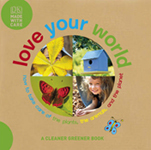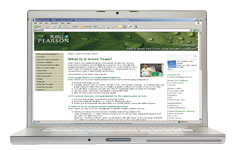Sustainable business practice
Achieving climate neutrality
Every person and every company has an impact on the environment and Pearson is no exception. Our books, magazines and newspapers use paper – a vitally important natural resource. We use energy to heat, cool and light our buildings and to power the computers we rely on to share our ideas, products and stories. Our people travel to and for work and our books, products and newspapers are shipped and driven all over the world. Globally, Pearson emits about 200,000 metric tonnes of carbon dioxide each year, about 70% of which is produced by our businesses in the US. In early 2007, we set ourselves the target of achieving climate neutrality for our existing businesses by the end of 2009. We'll seek to offset in 2010 whatever emissions we have been unable to avoid in 2009, supporting a range of projects that have the potential to either save or absorb a tonne of carbon for each tonne that we emit. In the UK, Pearson is switching to the international environment standard ISO 14001, an Environmental Management System (EMS) that enables us to address the delicate balance between maintaining our profitability and minimising our environmental impact. Initial assessments have been successfully completed across the FT, Pearson Education and Penguin in the UK, Pearson companies in India have begun the ISO 14001 process, and our companies in the US have been considering implementing this EMS. We introduced an Environment Policy back in 1992, reviewing and updating it in 2000, 2004, 2007 and again in 2008: the full policy can be viewed here.
Activity summary
Facilities managers across Pearson companies have been working on a programme of retro fitting buildings with better insulation, sensor lighting and energy efficient light bulbs to reduce our energy consumption. A major lighting upgrade at our distribution centre in Lebanon, Indiana delivered a $200,000 reduction in energy bills and reduced the carbon footprint of the building by 1,800 metric tonnes of CO2 (15%) in 2008. A server virtualisation programme we launched in 2006, covering the FT, Pearson Education, Pearson Australia and Pearson Shared Services in the UK has now helped us save over $10m and reduce our carbon footprint by over 3,500 metric tonnes of CO2.
By improving the video conferencing facilities in our buildings, our companies have been able to reduce the necessity to travel. Pearson held its first virtual Town Hall meeting on 3 December 2008, a highly interactive event allowing Pearson people from around the world to converse and discuss ideas without leaving the office. The total cost was less than 20% of traditional in-person forums through savings on a conference venue, travel fares and overnight accommodation, also avoiding over 300,000 air miles and the resulting emissions. For essential travel, we've been encouraging our people to avoid flights wherever possible and we're gradually 'greening' our car fleet. Over 40 Penguin staff travelled from the UK to the Frankfurt Book Fair by train in 2008, while Penguin in both the US and UK have reduced the number of cars in their fleet, aiming to replace others with hybrid vehicles as these become more affordable. More information on Green Penguin activity is available on the UK and US websites.
Across the company, Pearson people are volunteering to join Green Teams and Eco Committees to discuss and implement changes in habits and policy at their offices. More than 30 teams across Australia, Canada, India, the UK and the US are now involved in campaigning for their co-workers to turn off screens and computers, switch off lights, use tap instead of bottled water for meetings, join car pools, ride bicycles, and a myriad of other green tips and behavioural changes that will add up to make a big difference. We've also established two Green Funds in 2008 – one in the UK and one in North America – to stimulate innovation and investment by our operating companies in carbon saving programmes.
Snapshots
http://longmanusagoinggreen.com A website put together by the people at Longman ELT to offer green tips of the week, a link to an environmentally-friendly What's New 2009 catalogue with fewer pages, printed on recycled paper and mailed only to those who request it, plus an outline of the 'green' activities at Longman around the US.

Made With Care A video explaining Dorling Kindersley's newly launched Made with Care range, the greenest books ever made by the company, prepared with the most ethical and environmentally-friendly processes we could source.
Planet Pearson Planet Pearson is a cross-company environmental intranet site launched as a pilot in the US, with a view to expanding its usage across our international business. The site serves as a communications hub where Pearson people can share ideas, resources and suggestions on the many eco friendly initiatives taking place around the company.

Focus on: PAPER
Paper in the basic material upon which many of our businesses depend: we’ve identified its use as a key area of environmental impact for the company. We first implemented our official paper policy in June 2004 as one of the commitments we made following our signing of the UN Global Compact, and we’ve engaged in a number of ways to cut our paper use, source our supplies as responsibly as we can, and put something back to replace what we use.
The Penguin Group has chosen to source paper with a Forest Stewardship Council (FSC) paper certification where possible, meaning the paper must come from legal sources, must not come from an area of high conservation value and must not contain genetically modified material. The FSC Chain of Custody tracks timber from the forest to the final product, so that there is full traceability. Our use of FSC certified papers is increasing, but only a small percentage of the world’s forests are currently covered by any certification scheme, and only 8% of the world’s production forests are FSC certified. It is important that we use our buying power to use FSC papers where possible, as this makes it clear to the market that there is a demand for forest products that come from certified well managed sources.
By moving to using papers made from groundwood (the whole tree, not just selected parts of it), Pearson Education has been able to reduce the wood it uses by 26,000 tons, the equivalent of 450,000 trees. The initiative helped to save $4million.
We have purchased digital reading devices for Penguin’s sales force (US) and editorial and marketing staff (Australia, US and UK) to reduce paper use, such as Sony Readers and Amazon Kindles
Penguin Classics is supporting the Nature Conservancy’s Plant a Billion Trees campaign in the US with major marketing, publicity, and in-store promotions that increase public awareness and participation. The programme has already planted 1.4 million trees in Brazil, and every dollar donated to the conservancy will put another tree in the ground.
Many offices across Pearson now configure their network printers to double-sided printing as a default setting, helping to reduce office paper consumption, while many others now use recycled copy paper and are seeking to use fewer personal and more group printers.
Penguin and the Woodland Trust are creating a new wood, Penguin Wood, in a national forest in the Midlands, England. Nearly 400 members of staff at Penguin UK went on a charity walk in aid of the Woodland Trust ‘Trees for Schools’ campaign, raising £25,000 for the trust.
FAST FACTS
In 2008, Pearson and Penguin Canada were recognised for their paper choices with a Sustainability Award from Atlantic Packaging, acknowledging that their choices saved 10,389 mature trees in 2008, the equivalent of five American Football fields. Over 60% of Pearson Japan (Kirihara)'s material is now printed on recycled paper, and soy bean ink has been used in some of the business' publications since 2001.
A few words from… Rich Glicini
"Although Pearson is focused on reducing the company's harmful impact on the environment, we also find that our environmental initiatives almost always yield cost savings that further align our long-term goals with those of our stakeholders. For instance, our recent investments in high-definition video conferencing and online virtual meeting tools will reduce our carbon footprint while at the same time decreasing our business travel expenses. In addition to these benefits, we believe providing these meeting alternatives makes our people more productive and supports them in their quest for balance between their professional and personal lives.
We don't see a conflict between being a profitable business and being a good corporate citizen. Taking concrete steps to streamline and strengthen our operations while also reducing our environmental footprint is exactly the sort of win-win situation we like to pursue."

Rich Glicini Senior vice president, human resources, Pearson Inc. and environmental director, US
- Further information
- Legal statement/Disclaimer
- Forward looking statements
- Accessibility
- Site map
- © 2009 Pearson plc
